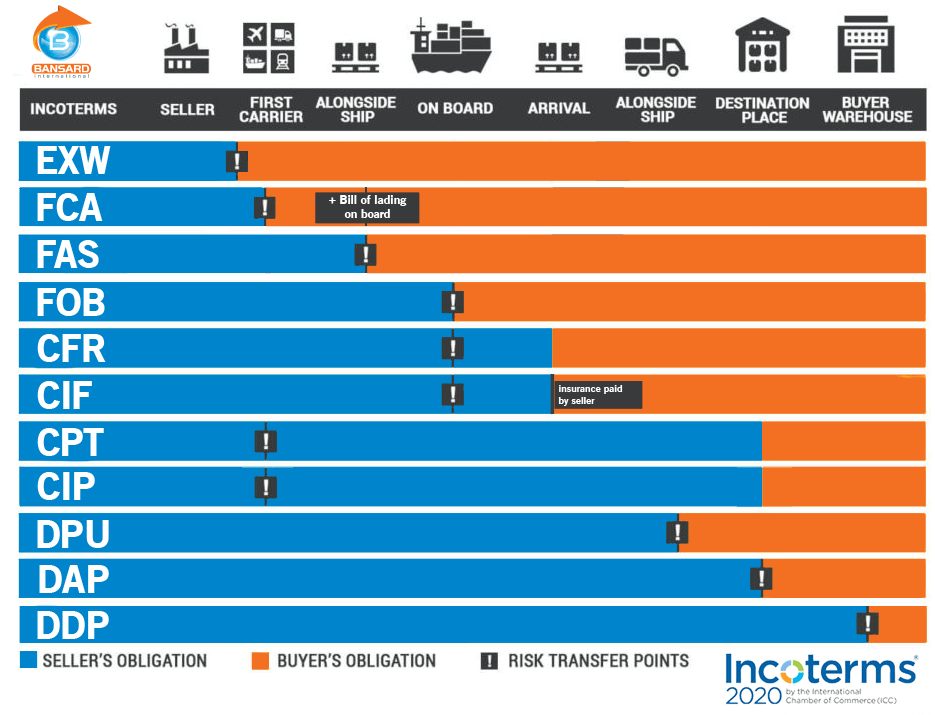International shipping rules.
In the product card, we specified the price and wrote down the rule according to which this price should be considered according to the international rules of INCOTERMS.
At the moment, all the goods on the site are listed on the basis of the independent collection of goods from the manufacturer (EXW). EXW (ex works, ex-works, ex-works): the goods are taken by the buyer from the seller’s warehouse specified in the contract, the payment of export duties is charged to the buyer.
This means that the actual value of the goods in your country may change, taking into account the cost of delivery and the number of government fees charged at the border of your country. Sometimes the value of the goods may increase by 1.5 times.
But we are also ready to arrange a full delivery cycle for you. To do this, write to your manager and get advice. We will calculate the cost of delivery of goods to your country.
Link to the official website of INCOTERMS.
What are Incoterms® rules?
The Incoterms® rules are the world’s essential terms of trade for the sale of goods. Whether you are filing a purchase order, packaging and labelling a shipment for freight transport, or preparing a certificate of origin at a port, the Incoterms® rules are there to guide you. The Incoterms® rules provide specific guidance to individuals participating in the import and export of global trade on a daily basis.
Who publishes the Incoterms® rules?
Since its founding in 1919, ICC has been committed to the facilitation of international trade.
Different practices and legal interpretations between traders around the world necessitated a common set of rules and guidelines. As a response, ICC published the first Incoterms® rules in 1936. We have been maintaining and developing them ever since.
As ICC celebrates its Centenary in 2019, the world business organization is pleased to announce the publication of Incoterms® 2020. The newest edition of the Incoterms® rules will help prepare business for the next century of global trade.
Why use Incoterms® rules in international trade?
Although other clauses for global trade exist around the world, such as the Harmonised Tariff Schedule of the United States, Incoterms® rules are global in their reach. Similarly, Incoterms® rules do not include trade terms codified for national purposes, such as the “less than truckload shipping” (LTL) rule of the United States. Unlike national trade policies, Incoterms® rules are universal, providing clarity and predictability to business.
What does “Incoterms®” stand for?
“Incoterms®” is an acronym standing for international commercial terms. “Incoterms®” is a trademark of International Chamber of Commerce, registered in several countries.
The Incoterms® rules feature abbreviations for terms, like FOB (“Free on Board”), DAP (“Delivered at Place”) EXW (“Ex Works”), CIP (“Carriage and Insurance Paid To”), which all have very precise meanings for the sale of goods around the world.
These terms hold universal meaning for buyers and sellers around the world. If you are a financial analyst in the City of London, then you might associate the acronym “FCA” with the United Kingdom’s Financial Conduct Authority. However, for importers and exporters around the world, FCA are the initials used for “Free Carrier,” or the seller’s obligation to deliver the goods to the carrier nominated by the buyer at the seller’s premises or another named place.
When were ICC’s Incoterms® rules last updated?
ICC last updated the Incoterms® rules in 2019. While Incoterms® 2020 is the most current version of the trade terms, Incoterms® 2010 is still in effect today and can be accessed under our resources for business.
What happened to Incoterms 2015, Incoterms 2016, Incoterms, 2017, Incoterms 2018, and Incoterms 2019…?
Don’t worry, you didn’t miss them. They don’t exist! The latest edition of the Incoterms® rules is Incoterms® 2020. However, Incoterms® 2010 remains in effect for those using them.
To learn more about the evolution of Incoterms® rules, please visit Incoterms® rules history.
